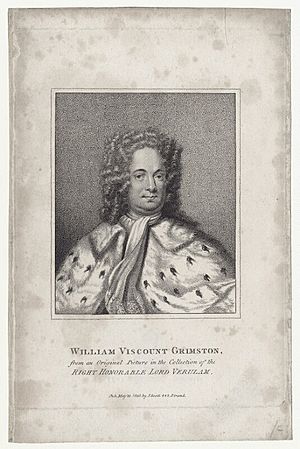William Grimston, 1st Viscount Grimston facts for kids
William Grimston, 1st Viscount Grimston (born 31 December 1684 – died 15 October 1756) was an important English noble and politician. He served in the House of Commons of Great Britain, which is a part of the British Parliament, between 1710 and 1734.
Contents
Early Life and Family
William Grimston was born as William Luckyn. His father was Sir William Luckyn, who held the title of 3rd Baronet. His mother was Mary Sherrington.
In 1700, when he was about 16 years old, William inherited a lot of land and property. This included a large estate called Gorhambury, located near St Albans. He inherited these from his great-uncle, Sir Samuel Grimston. After this, William changed his last name from Luckyn to Grimston.
In 1706, William Grimston married Jean Cooke. They had a large family together, with ten sons and three daughters.
A Playwright's Tale
In 1705, before he became a politician, William Grimston wrote a play. It was called 'The Lawyer's Fortune or Love in a Hollow Tree'. Later in his life, he tried to make sure that all copies of his play were removed from circulation.
However, a famous and powerful woman named Sarah, Duchess of Marlborough, found a copy. In 1736, she published her own version of the play. She added notes to it that made fun of William Grimston.
Political Career
William Grimston started his political journey in 1710. He was elected as a Member of Parliament (MP) for the area of St Albans. An MP is someone chosen by voters to represent them in Parliament. He won his first election without anyone running against him.
He was elected again in 1713. In 1715, he won the seat once more. However, in 1722, he lost the election for St Albans.
Becoming a Viscount
In 1719, William Grimston received a special honor. He was given the titles of Baron Dunboyne and Viscount Grimston. These titles were part of the Peerage of Ireland. This meant he was considered a noble in Ireland.
Because these were Irish titles, they did not stop him from being a Member of Parliament in Britain. He could still serve in the British House of Commons.
Rivalry in Politics
William Grimston often faced strong competition in his political career. Sarah, Duchess of Marlborough, was a very influential person in St Albans. She also wanted to control who got elected there.
Grimston and the Duchess had a long-lasting rivalry. They both tried to stop each other's chosen candidates from winning elections in St Albans. This continued until the Duchess passed away.
Grimston managed to win back his seat in St Albans in 1727. But he lost it again in the election of 1734.
Later Life and Legacy
In 1737, William Grimston inherited another title. He became the fifth Baronet, following his older brother, Sir Harbottle Luckyn.
William Grimston passed away in October 1756, when he was 72 years old. His son, James, took over his titles. Lady Grimston, his wife, died a few years later in 1765.
 | Emma Amos |
 | Edward Mitchell Bannister |
 | Larry D. Alexander |
 | Ernie Barnes |


